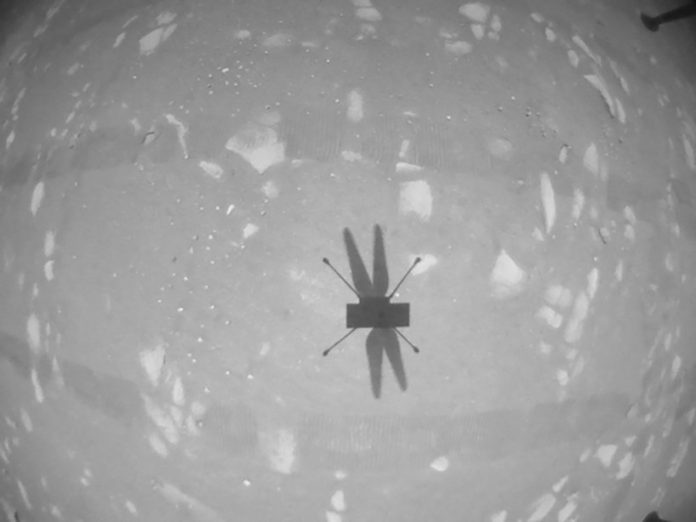FROM the depths of the ocean to the wilds of Antarctica, and now to the surface of Mars, the Revd Pamela Conrad has explored them all as an astro-biologist for the United States space agency NASA. But, as a priest in the Episcopal Church, these explorations, she says, have above all shown her the “endless creativity of God”.
“The most important lesson I’ve learned is not to put God in a box that is too small. The imagination of God is beyond the imagination of humans, and we should not be surprised by anything, but be delighted by how creative God is.”
In addition to her ministry, Ms Conrad is currently working as a scientific investigator for NASA’s Mars rover mission, which has successfully flown the helicopter Ingenuity across Mars — the first time that a powered controlled flight by an aircraft has been conducted from another world. She describes Ingenuity as the “ultimate radio-controlled toy”.
She is Rector of Glen Burnie, Maryland, where her congregation is proud of her scientific work. But it was not always easy, she says, to marry her calling to science and to the Church, although she felt a “calling for both from as far back as I know”.
“I met with resistance on both sides, but particularly in the Church. I had to be undercover for a long time. In the scientific community, if you are religious there is a fear you might be less objective as a scientist; so I did not say anything for a long time.”
She had also left the Church as a young woman in fury at its treatment of women’s leadership. “I never rejected my faith or following Jesus; in retrospect, I was always searching what it meant to be in community, but I didn’t understand I was being called back into a faith community.”
Her journey back into the Church began while she was working as a scientist in Antarctica. “I released my anger at the imperfection of humans in Antarctica, with the winds howling around me and the mountains in front of me. . . All of a sudden, my anger dissolved: it was a Holy Spirit moment.”
 NASA/JPL-CaltechIn-flight image from Ingenuity’s second flight
NASA/JPL-CaltechIn-flight image from Ingenuity’s second flight
Another moment came when she witnessed a child screaming in anger as part of a Christian anti-gay protest, encouraged by her parents. “I thought: that isn’t what church should be. I realised, had I not left, I could have been a voice trying to build a bridge.”
She went forward for ordination, but the first time was rejected, after an interviewer said, “Aren’t you too famous to be a priest?” Supported by her parish, however, she went back again, and all resistance melted away, she said. She was ordained in 2017.
“I’m a full-time priest, and my parish is my highest priority; there are lots of pastoral needs, particularly given the pandemic. I had quit my job, and thought I would figure out a way to use science and exploration in my ministry. But I had funding available to work on the Mars mission, and I thought I could use the work to enhance my ministry. It’s the exotic part of my life — but I feed my soul through being a priest.”
Science makes its way into most of her sermons, she says. In her work as a priest and a scientist, she emphasises that faith and science are connected — something that she also embodies in her leadership position in the North American province of the Society of Ordained Scientists — and sees the search for life on Mars as an affirmation of a God, who exceeds human understanding.
“I do not know if there is life on other planets, but I’m a person who hopes there is life on other planets. As a person of faith, I think God has a huge amount of creativity. What we know is we are so far from understanding everything about the universe that the possibilities are endless.”
Although she describes herself as in love with exploration, and “in love with being alive”, she is aware of the ethical issues raised by the colonisation of space, as well as parts of this planet such as Antarctica and the oceans. It also raises questions for the Church, she says.
“There are ethical concerns about the exploration of anything, as human beings are notoriously colonial. I want us to explore more gently, to carry out post-colonial exploration, without feeling it is our right to do so. The Church has a poor track record on colonial expansion, particularly in my country. We have to find a new way of sharing our faith and the connectedness for all things without trying to acquire new members.
“This is a moment of our evolution of the Church where we have the opportunity to examine who we are, and where we are going, and what it means to follow Jesus.”







